高二虚拟语气练习题-英语及答案教师版
- 格式:doc
- 大小:1.66 MB
- 文档页数:44
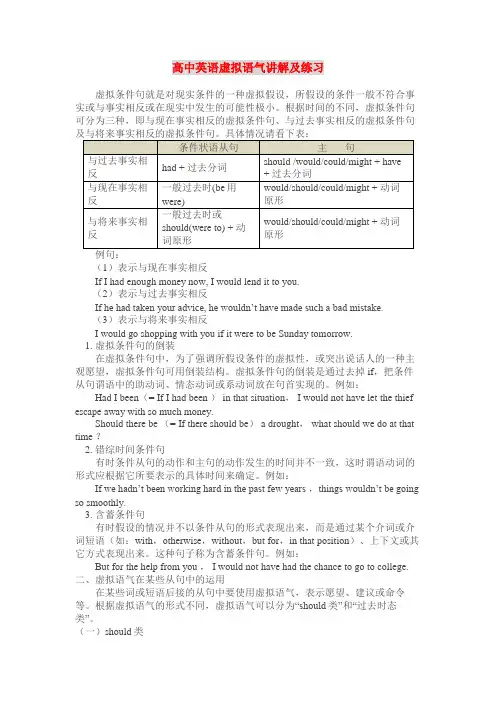
高中英语虚拟语气讲解及练习虚拟条件句就是对现实条件的一种虚拟假设,所假设的条件一般不符合事实或与事实相反或在现实中发生的可能性极小。
根据时间的不同,虚拟条件句可分为三种,即与现在事实相反的虚拟条件句、与过去事实相反的虚拟条件句(1)表示与现在事实相反If I had enough money now, I would lend it to you.(2)表示与过去事实相反If he had taken your advice, he wouldn’t have made such a bad mistake.(3)表示与将来事实相反I would go shopping with you if it were to be Sunday tomorrow.1. 虚拟条件句的倒装在虚拟条件句中,为了强调所假设条件的虚拟性,或突出说话人的一种主观愿望,虚拟条件句可用倒装结构。
虚拟条件句的倒装是通过去掉if,把条件从句谓语中的助动词、情态动词或系动词放在句首实现的。
例如:Had I been(= If I had been ) in that situation, I would not have let the thief escape away with so much money.Should there be (= If there should be) a drought, what should we do at that time ?2. 错综时间条件句有时条件从句的动作和主句的动作发生的时间并不一致,这时谓语动词的形式应根据它所要表示的具体时间来确定。
例如:If we hadn’t been working hard in the past few years ,thing s wouldn’t be going so smoothly.3. 含蓄条件句有时假设的情况并不以条件从句的形式表现出来,而是通过某个介词或介词短语(如:with,otherwise,without,but for,in that position)、上下文或其它方式表现出来。
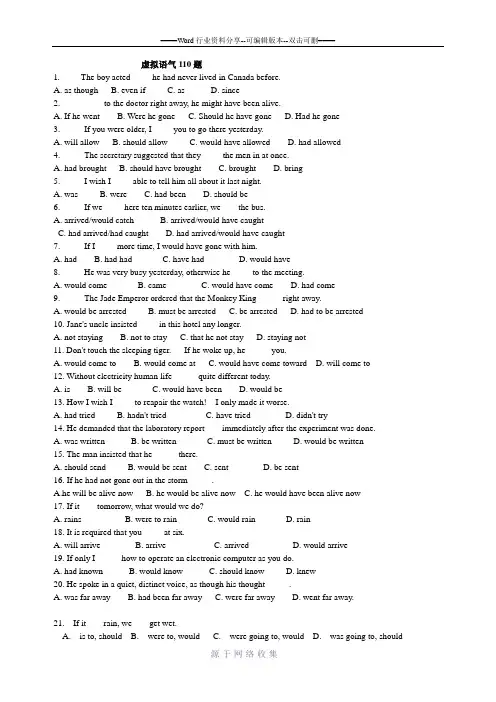
虚拟语气110题1. The boy acted ____ he had never lived in Canada before.A. as thoughB. even ifC. asD. since2. ____ to the doctor right away, he might have been alive.A. If he wentB. Were he goneC. Should he have goneD. Had he gone3. If you were older, I ____ you to go there yesterday.A. will allowB. should allowC. would have allowedD. had allowed4. The secretary suggested that they ____ the men in at once.A. had broughtB. should have broughtC. broughtD. bring5. I wish I ____ able to tell him all about it last night.A. wasB. wereC. had beenD. should be6. If we ____ here ten minutes earlier, we ___ the bus.A. arrived/would catchB. arrived/would have caughtC. had arrived/had caughtD. had arrived/would have caught7. If I ____ more time, I would have gone with him.A. hadB. had hadC. have hadD. would have8. He was very busy yesterday, otherwise he ____ to the meeting.A. would comeB. cameC. would have comeD. had come9. The Jade Emperor ordered that the Monkey King _____ right away.A. would be arrestedB. must be arrestedC. be arrestedD. had to be arrested10. Jane's uncle insisted ____ in this hotel any longer.A. not stayingB. not to stayC. that he not stayD. staying not11. Don't touch the sleeping tiger. If he woke up, he _____ you.A. would come toB. would come atC. would have come towardD. will come to12. Without electricity human life _____ quite different today.A. isB. will beC. would have beenD. would be13. How I wish I ____ to reapair the watch! I only made it worse.A. had triedB. hadn't triedC. have triedD. didn't try14. He demanded that the laboratory report ___ immediately after the experiment was done.A. was writtenB. be writtenC. must be writtenD. would be written15. The man insisted that he _____ there.A. should sendB. would be sentC. sentD. be sent16. If he had not gone out in the storm _____.A.he will be alive nowB. he would be alive nowC. he would have been alive now17. If it ___ tomorrow, what would we do?A. rainsB. were to rainC. would rainD. rain18. It is required that you ____ at six.A. will arriveB. arriveC. arrivedD. would arrive19. If only I _____ how to operate an electronic computer as you do.A. had knownB. would knowC. should knowD. knew20. He spoke in a quiet, distinct voice, as though his thought _____.A. was far awayB. had been far awayC. were far awayD. went far away.21. If it ___ rain, we ___ get wet.A. is to, shouldB. were to, wouldC. were going to, wouldD. was going to, should22. If he ___ to the teacher attentively, he ___ the answer to the problem now.A. had listened, would have knownB. listened, would knowC. listened, would have knownD. had listened, would know23. But for the party, he ___ of hunger 30 years ago.A. would have diedB. would dieC. must have diedD. must die24. ___ today, he would got there for holiday.A. Was he leavingB. Were he to leaveC. Would he leaveD. If he leaves25. I would have come earlier, but I ___ that you were waiting for me.A. didn’t knowB. hadn’t knowC. would have knownD. haven’t known26. It’s high tim e that we ___ to school.A. would toB. wentC. goD. will go27. It seems as if it ___ rain.A. willB. is going toC. is toD. were going to28. I’d rather you ___ right away.A. leaveB. leftC. will leaveD. to leave29. He is working hard for fear that he ___.A. failsB. failedC. would failD. fail30. It is really strange that the girl ___ so early.A. has been marriedB. has marriedC. be marriedD. would marry31. Supposing I ___ this gift, what would he say?A. acceptB. acceptedC. should acceptD. would accept32. The teacher agreed to the suggestion that the students ___ two weeks to prepare for the exam.A. giveB. should giveC. be givenD. would be given33. I was busy yesterday, otherwise I ___ your birthday party.A. attendedB. had attendedC. would attendD. would have attended34. He insisted that he ___ me before.A. seeB. should seeC. had seenD. saw35. The two strangers talked as if they ___ friends for years.A. wereB. would beC. have beenD. had been36. We ___ our lives had it not been for the policeman.A. would have lostB. should loseC. might loseD. could have lost37. ---- I thought you would come back tomorrow.---- I would if I ___ to attend a meeting.A. don’t haveB. didn’t haveC. will not haveD. would not have38. He wishes ___ mistakes.A. he doesn’t always makeB. he isn’t always makingC. he didn’t always makeD. he wouldn’t always making39. It ___ very nice if only it were possible.A. will beB. would beC. isD. were40. Without your help, our team ___ the last match.A. won’t winB. will loseC. wouldn’t have wonD. can’t win41. I wish ___ I what to do.A. knewB. have knownC. knowD. would know42. ___, I would take an umbrella with me.A. Had I been youB. I were youC. Were I youD. I had been you43. If I had hurried, I ___ the train.A. would catchB. could catchC. would have caughtD. had caught44. He insisted that John ___ it.A. doB. doesC. didD. would do45. It is high time we ___ off.A. areB. wereC. beD. will be46. He felt as if he ___ more time to study for the test.A. needsB. were neededC. neededD. need47. It is important that I ___ with Mr. Willians immediately.A. speakB. spokeC. will speakD. to speak48. James wishes he ___ the football game instead of the film.A. sawB. seeC. had been seenD. had seen49. I wish ___.A. he leftB. he leaves me aloneC. he be leftD. he would leave me alone50. If I had known that, I ___ so.A. wouldn’t doB. wouldn’t have doneC. won’t doD. have not done51. The doctor suggested that she ___.A. will not smokeB. not smokeC. would not smokeD. did not smoke52. If I ___ you, I wouldn’t return the call.A. beB. amC. wasD. were53. You talk as if you ___ there.A. were reallyB. has really beenC. had really beenD. would really be54. He suggested that the work ___ at once.A. would startedB. would be startedC. should startedD. should be started55. It is strange that such a thing ___ in your school.A. will happenB. happenC. should happenD. happened56. It is imperative that you ___ on time.A. areB. will beC. beD. would be57. I didn’t go to the party, but I do wish I ___ th ere.A. wasB. wereC. had beenD. went58. It is time we ___ up our results.A. sumB. summedC. will sumD. would sum59. If the doctor had been available, the child ___.A. would not dieB. would not have diedC. could not dieD. could not have died60. Dr. Bethune worked hard as if he ___.A. never had felt tiredB. had never felt tiredC. never felt tiredD. was tired never61. I enjoyed the movie very much. I wish I ___ the book from which it was made.A. have readB. had readC. should have readD. am reading62. You are late. If you ___ a few minutes earlier, you ___ him.A. came/ would meetB. had come/ would have metC. come/ will meetD. had come/ would met63. I wish my husband ___ as well as yours.A. had dressedB. dressC. will dressD. dressed64. Edison kept phosphorus carefully in a bottle lest it ___.A. would burnB. burnedC. was burningD. should burn65. He looked as if he ___ ill for a long time.A. wasB. wereC. has beenD. had been66. If the doctor had come earlier, the poor child ___.A. would not have been lied there for two hoursB. would not have laid there for two hoursC. would not have lied there for two hoursD. would not have lain there for two hours67. I wish that I ___ with you last night.A. wentB. could goC. have goneD. could have gone68. Let’s say you could go there again, how ___ feel?A. will youB. should youC. would youD. do you69. Mr. Brown left for London long ago. That’s pity. I wish ___.A. I meet him.B. I’ll have met himC. I’d had met himD. I’d meet him70. I can’t stand him. He always talks as though he ___ every thing.A. knewB. knowsC. has knownD. had known71. I wish I ___.A. will tell him thatB. didn’t tell him thatC. told him not thatD. had not told him that72. If you had told me in advance, I ___ him at the airport.A. would meetB. would had meetC. would have metD. would have meet73. Kunar can take his car apart and put it back together again. I certainly wish he ___ me how.A. teachesB. will teachC. has taughtD. would teach74. I would have told him the answer had it been possible but I ___ so busy then.A. had beenB. wereC. wasD. would be75. I wish I ___ able to tell him all about it last night.A. should beB. wereC. had beenD. was76. If it ___ another ten minutes, the game would have been called off.A. had rainedB. would had rainedC. have seenD. did see77. He suggested that they ___ use a trick instead of fighting.A. shouldB. wouldC. doD. had78. My father did not go to New York; the doctor suggested that he ___ there.A. not wentB. won’t goC. not goD. not to go79. I would have gone to the meeting if I ___ time.A. had hadB. have hadC. hadD. would have had80. John wished ___.A. he will study moreB. he had studied moreC. he studiesD. he won’t have studied more81. You look so tired tonight. It is time you ___.A. go to sleepB. went to sleepC. go to bedD. went to bed82. “Why didn’t you buy a new car?” “I would have bought one if I ___ enough money. ”A. hadB. have hadC. would haveD. had had83. I recommended that the student ___ his composition as soon as possible.A. finishing writingB. should finish the writingC. finish writingD. finished writing84. If she could sew, ___.A. she make a dressB. she would have made a shirtC. she will make a shirtD. she would had made a coat85. ___ today, he would get there by Friday.A. Would he leaveB. Was he leavingC. Were he to leaveD. If he leaves86. His doctor suggested that he ___ a short trip abroad.A. will takeB. would takeC. takeD. took87. The Bakers arrived last night, if they’d only let us know earlier, ___ at the st ation.A. we’d meet themB. we’ll meet themC. we’d have met themD. we’ve met them88. If I __ you, I ___ more attention to English idioms and phrases.A. was/ shall payB. am/ will payC. would be/ would payD. were/ would pay89. We might have failed if you ___ us a helping hand.A. have not givenB. would not giveC. had not givenD. did not give90. The Law requires that everyone ___ his car checked at least once a year.A. hasB. hadC. haveD. will have91. I wish ___ I busy yesterday; I could have helped you with the problem.A. hadn’t beenB. weren’tC. wasn’tD. have not been92. Had I known her name, ___.A. or does she know mine?B. and where does she live?C. she would be beautifulD. I would have invited her to lunch93. He has just arrived, but he talks as if he ___ all about that.A. knowB. knowsC. knownD. knew94. If I ___ the money, I would have bought a much bigger car.A. possessedB. ownedC. hadD. had had95. I wish I ___ a young man again.A. amB. wasC. wereD. will be96. The librarian insists that John ___ no more books from the library before he returns all the books he had borrowed.A. will takeB. tookC. takeD. takes97. I left very early last night, but I wish I ___ so early.A. didn’tB. hadn’t leftC. haven’t leftD. couldn’t leave98. I do not have a job. I would find one but I ___ no time.A. hadB. didn’t hav eC. had hadD. have99. I wish that you ___ such a bad headache because I’m sure that you would have enjoyed the concert.A. hadn’tB. didn’t have hadC. hadn’t hadD. hadn’t have100. He insisted that we all ___ in his office at one o’clock.A. beB. to beC. would beD. shall be101. Helen couldn’t got to France after all. That’s too bad, I’m sure she would have enjoyed it if ___. A. she’s gone B. she’ll go C. she’d gone D. she’d go102. I must go there earlier. John has suggested that I ___ an hour before the discussion begins.A. goB. shall goC. will goD. would go103. If her husband had not liked the dress ___.she would be delighted B. he would get madC. she would have returned it D she must have taken it back to the store104. If I ___ you, I ___ worry.A. were/ wouldn’tB. was/ wouldn’tC. been/ would haveD. be/ would105. We ___ delighted if the report ___ true.A. were/ wereB. shall be/ wereC. should be/ wereD. were/ would be106. If he ___ here, he ___ you.A. had been/ would have helped C. would have been/ should have helpedB. were/ had helped D. would have been/ would had helped107. If I ___ so busy, I ___ the lecture that day.A. were not be/ should attendB. should not/ should have attendC. was not/ would attendD. had not been/ would have attended108. If I ___ the way to New York, I ___.knew / would drive B. knew/ will driveC. knew/ would have driveD. had known/ would drive109. But for the leadership of our Party, we ___.shouldn’t succeed B. could not have succeedC. will not succeedD. should not have succeeded110. You ___ the train if you ___ a little earlier.A. could take/ startedB. could have taken/ had startedC. could take/ had startedD. could have taken / started1.a2. d3. c4. d5. c6. d7. b8. c9. c 10. c 11. b 12. d 13. b 14. b 15. d 16. c 17. b18. b 19. d 20. b.21.b 22. d 23. a 24. b 25. a 26. b 27. b 28. b 29. d 30. c 31. b 32. c 33. d 34. c 35. d 36.a 37.b 38.c 39. b 40. c 41. a 42. c 43.c 44. a 45. b 46.c 47. a 48d 49. d 50. b 51. b 52. d 53. c 54. d 55.c 56. c 57. c 58. b 59. b 60. b 61. b 62. b 63.d 64. d 65. d 66. d 67. d 68. c 69. c 70.a 71. d 72. c 73. d 74. c 75. c 76. a 77. a 78. c 79. a 80.b 81. d 82. d 83.c 84. b 85. c86. c 87. c 88. d 89. c 90. c 91. a 92. d 93. d 94. d 95. c 96. c 97. b 98. d 99. c 100.a 101. c 102. a 103. c 104. a 105. c 106. a 107. d 108. a 109. d 110. b虚拟语气虚拟语气是动词的一种特殊形式。
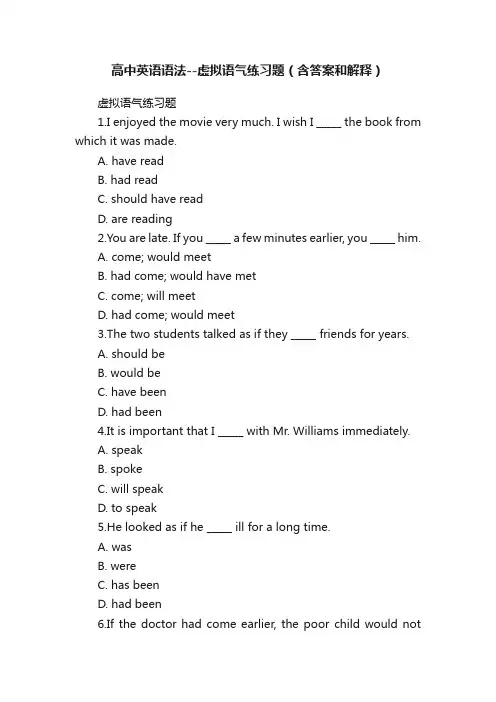
高中英语语法--虚拟语气练习题(含答案和解释)虚拟语气练习题1.I enjoyed the movie very much. I wish I _____ the book from which it was made.A. have readB. had readC. should have readD. are reading2.You are late. If you _____ a few minutes earlier, you _____ him.A. come; would meetB. had come; would have metC. come; will meetD. had come; would meet3.The two students talked as if they _____ friends for years.A. should beB. would beC. have beenD. had been4.It is important that I _____ with Mr. Williams immediately.A. speakB. spokeC. will speakD. to speak5.He looked as if he _____ ill for a long time.A. wasB. wereC. has beenD. had been6.If the doctor had come earlier, the poor child would not_____.A. have laid there for two hoursB. have been lied there for two hoursC. have lied there for two hoursD. have lain there for two hours7.I wish that I _____ with you last night.A. wentB. could goC. have goneD. could have gone8.Let’s say you c ould go there again, how _____ feel?A. will youB. should youC. would youD. do you9.I can’t stand him. He always talks as though he _____ everything.A. knewB. knowsC. has knownD. had known10._____ the fog, we should have reached our school.A. Because ofB. In spite ofC. In case ofD. But for11.If you had told me in advance, I _____ him at the airport.A. would meetB. would had metC. would have metD. would have meet12.Mike can take his car apart and put it back together again.I certainly wish he_____ me how.A. teachesB. will teachC. has taughtD. would teach13.I would have told him the answer had it been possible, but I _____ so busy then.A. had beenB. wereC. wasD. would be14.He’s working hard for fear that he _____.A. should fall behindB. fell behindC. may fall behindD. would fallen behind15.If it _____ another ten minutes, the game would have been called off.A. had rainedB. would have rainedC. have seenD. rained16.He suggested that they _____ use a trick instead of fighting.A. shouldB. wouldC. doD. had17.My father did not go to New York; the doctor suggestedthat he _____ there.A. not wentB. won’t goC. not goD. not to go18.I would have gone to the meeting if I _____ time.A. had hadB. have hadC. hadD. would have had19.Would you rather I _____ buying a new bike?A. decided againstB. will decide againstC. have decidedD. shall decide against20.You look so tired tonight. It is time you _____.A. go to sleepB. went to sleepC. go to bedD. went to bed21.—W hy didn’t you buy a new car?—I would have bought one if I _____ enough money.A. hadB. have hadC. would haveD. had had22.If she could sew, _____.A. she make a dressB. she would have made a shirtC. she will make a shirtD. she would had made a coat23._____ today, he would get there by Friday.A. Would he leaveB. Was he leavingC. Were he to leaveD. If he leaves24.His doctor suggested that he _____ a short trip abroad.A. will takeB. would takeC. takeD. took25.The Bakers arrived last nig ht. If they’d only let us know earlier,_____ at the station.A. we’d meet themB. we’ll meet themC. we’d have met themD. we’ve met them26.If I _____ you, I _____ more attention to English idioms and phrases.A. was; shall payB. am; will payC. would be; would payD. were; would pay27.We might have failed if you _____ us a helping hand.A. have not givenB. would not giveC. had not givenD. did not give28.The law requires that everyone _____ his car checked at least once a year.A. hasB. hadC. haveD. will have29.It is strange that he _____ so.A. would sayB. would speakC. should sayD. will speak30.Had I known her name, _____A. or does she know mine?B. and where does she live?C. she would be beautiful.D. I would have invited her to lunch.31.He has just arrived, but he talks as if he _____ all about that.A. knowB. knowsC. knownD. knew32.If I _____ the money, I would have bought a much bigger car.A. possessedB. ownedC. hadD. had had33.He was very busy yesterday; otherwise, he _____ to the meeting.A. would comeB. cameC. would have comeD. will come34.The librarian insists that John _____ no more books from the library before he returns all the books he has borrowed.A. will takeB. tookC. takeD. takes35.I left very early last night, but I wish I _____ so early.A. didn’t leaveB. hadn’t leftC. haven’t leftD. couldn’t leave36.I do not have a job. I would find one but I _____ no time.A. hadB. didn’t haveC. had hadD. have37.I wish that you _____ such a bad headache because I’m sure that you would have enjoyed the concert.A. hadn’tB. didn’t have hadC. hadn’t hadD. hadn’t have38.He insisted that we all _____ in his office at one o’clock.A. beB. to beC. would beD. shall be39.Helen couldn’t go to France after all. That’s too bad. I’m sure she would have enjoyed it if _____.A. she’s goneB. she’ll goC. she’d goneD. she’d go40.I must go there earlier. John has suggested that I _____ an hour before the discussion begins.A. goB. shall goC. will goD. would go1—5 BBDAD 6—10 DDCAD11—15 CDCAA16—20 ACAAD21—25 DBCCC 26—30 DCCCD31—35 DDCCB 36—40 DCACA解析:1.wish后面用虚拟语气,表示与过去事实相反用过去完成时。
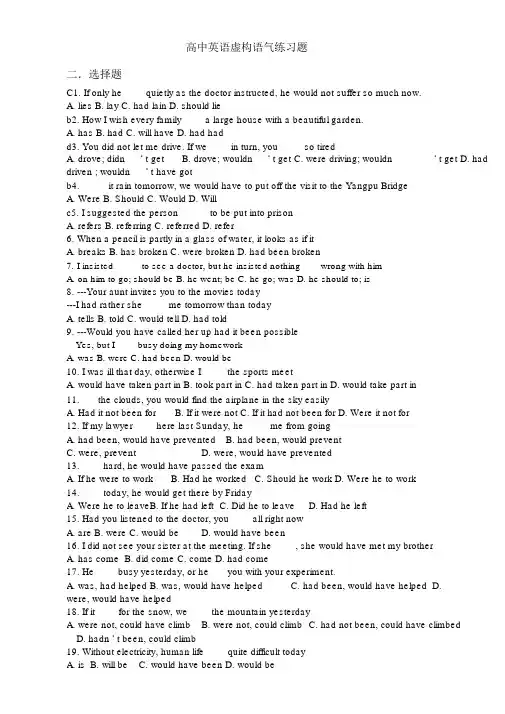
高中英语虚构语气练习题二.选择题C1. If only he ____quietly as the doctor instructed, he would not suffer so much now.A. liesB. layC. had lainD. should lieb2. How I wish every family ____a large house with a beautiful garden.A. hasB. hadC. will haveD. had hadd3. You did not let me drive. If we ____in turn, you ____ so tiredA. drove; didn’ t getB. drove; wouldn’ t getC. were driving; wouldn’ t getD. had driven ; wouldn’ t have gotb4. _____it rain tomorrow, we would have to put off the visit to the Yangpu BridgeA. WereB. ShouldC. WouldD. Willc5. I suggested the person _____ to be put into prisonA. refersB. referringC. referredD. refer6.When a pencil is partly in a glass of water, it looks as if it____A. breaksB. has brokenC. were brokenD. had been broken7.I insisted _____to see a doctor, but he insisted nothing ___ wrong with himA. on him to go; should beB. he went; beC. he go; wasD. he should to; is8.---Your aunt invites you to the movies today---I had rather she ____ me tomorrow than todayA. tellsB. toldC. would tellD. had told9.---Would you have called her up had it been possible---Yes, but I ____busy doing my homeworkA. wasB. wereC. had beenD. would be10.I was ill that day, otherwise I ____ the sports meetA. would have taken part inB. took part inC. had taken part inD. would take part in11.___the clouds, you would find the airplane in the sky easilyA. Had it not been forB. If it were notC. If it had not been forD. Were it not for12.If my lawyer ____here last Sunday, he ____ me from goingA. had been, would have preventedB. had been, would preventC. were, preventD. were, would have prevented13.____hard, he would have passed the examA. If he were to workB. Had he workedC. Should he workD. Were he to work14.____today, he would get there by FridayA. Were he to leaveB. If he had leftC. Did he to leaveD. Had he left15.Had you listened to the doctor, you ____all right nowA. areB. wereC. would beD. would have been16.I did not see your sister at the meeting. If she ____, she would have met my brotherA. has comeB. did comeC. comeD. had come17.He ____busy yesterday, or he ___you with your experiment.A. was, had helpedB. was, would have helpedC. had been, would have helpedD.were, would have helped18.If it ____for the snow, we____ the mountain yesterdayA. were not, could have climbB. were not, could climbC. had not been, could have climbedD. hadn ’ t been, could climb19.Without electricity, human life ____quite difficult todayA. isB. will beC. would have beenD. would be20. ---I am going to tell her the news---I would as soon you _____her about itA. didn’ t tellB. don’ t tellC. hadnD. ’wonttell’ t tell21.Mike ’ s father, as well as his mother, insisted he ____homeA. stayedB. could stayC. has stayedD. stay22.It was requested that the play ____againA. should put onB. would put onC. be put onD. put on23.She insisted that a doctor _____ immediatelyA. had sent forB. sendC. be sent forD. was sent24.---Did you scold him for his carelessness----Yes, but ____itA. I ’ d rather not Bdo.I ’ d rather not have done C. I should’ Dtdo.I’ d better not do25. If only I ___my carA. hadn ’ t lostB. wouldn ’ t loseC. didn’ t loseD. haven ’ t lost26. But for water, it ____impossible to live in the earthA. isB. wouldC. wereD. wouldn ’ t be27.I would rather you ____anything about it for the timebeing A. do B. didn ’ t doC. don ’t D.didn ’t28.The kind-hearted couple treat the orphan very well as though he ____ their own sonA. isB. wereC. had beenD. should be29.How the old people wish that they ____young once moreA. wereB. could becomeC. had beenD. should be30.It is high time that we ____ a meeting to discuss this problemA. holdB. heldC. have heldD. had held31.The thief closed his eyes ____ he ____dyingA. even if , wasB. though, would beC. even, had beenD. as if, were32.I wish that you ____ such a bad headache because I am sure that you would have enjoyed the concertA. had notB. did not have hadC. hadn ’ t hadD. hadn ’ t have33.The chairman insisted that we ____the question againA. will discussB. to discussC. should discussD. will be discussed34.He requested that the students ____them get in cropsA. helpB. to helpC. helpedD. helping35.The guard at the gate insisted that everybody _____the rulesA. obeysB. ObeyC. will obeyD. would obey36.I wish I ____here thenA. wasB. had beenC. wereD. would be37.It is strange that he ____back so earlyA. cameB. will comeC. had comeD. should have come38.Mother suggested that I ___my homework first before watching TVA. didB. doC. shall doD. have done39.My suggestion is that the meeting ____off till nest SundayA. be putB. putC. should putD. had been put40.He is talking so much about America as if he ____ thereA. had beenB. has beenC. wasD. been41.The teacher demanded that the exam _____ before elevenA. must finishB. would be finishedC. be finishedD. must be finished42.---Sorry, Joe. I did not meanto ⋯⋯---- Don’ t call me“ Joe” , I am Mr. Parker to you, and ____ you forget it!A. doB. didn’tC. didD. don ’t43. I did not attend the lecture by Pro. Jackson. I ____ but I ____ all this morningA. would, have washedB. could, have been washingC. would have, have been washingD . could have, had washing44.How I wish I ____ to repair the watch! I only made it worseA. had triedB. hadn’ t triedC. have triedD. didn ’ t try45.----How could I thank you enough?---- Don’ t mention it. Any other man ____itA. must doB. could doC. would have doneD. should have done46.Key European governments insist Iraq-operation’sco____ good and military action______ to allow inspections to continueA. be, be delayedB. is, delayC. should be, be delayedD. is , be delayed47.If the hurricane had happened during the day-time, ____more deathsA. it would have beenB. it would beC. there would beD. there would have been48.What the customers_____ from the company is that the goods ____ right to their homes. A. requested, deliver B. demand, be delivered C. request, should deliver D. demand, delivered49.If law-breakers _____ the society will be in disorderA. made unpunishedB. came unpunishedC. went unpunishedD. not punished50.We took a taxi to the airport. Otherwise we ____lateA. would beB. wereC. will beD. would have been51.Supposing he never ____, what would happen thenA. comeB. cameC. would comeD. will come52.What do you think his proposal that we ____ a play at the English meetingA. had put onB. should put onC. have put onD. will put on53.I hope that you ____ rightA. will beB. should beC. wereD. would be54.As you know, I am a disabled man, but I would be happy if I ___of service toyou A. am B. have beenC. should be D. would be55.He insisted that we ____early the next morningA. startB. startedC. would startD. had started56.I did not see your sister at the meeting. If she ____, she would have met my brotherA. has comeB. did comeC. had comeD. came57.We ____last night, but we went to the cinema insteadA. must have studiedB. might studyC. would studyD. would have studied58.If it _____the snow, we _____the Simian Mountain last weekA. were not, could have climbedB. were not, could climbC. had not been , could have climbedD. had not been, could climb答案CBDBCCCBAADABACDBCDADCCBACBBABDCCABBDBAACDCBCDDBCDBBAAACDCWelcome to Chunxiao Online Classes虚构语气在条件状语从句中的应用【经典例题】1.If my lawyer _______ here last Saturday, he _______ mefrom going.A. had been; would have preventedB. had been; would preventC. were; would preventD. were; would have prevented2. If I had worn my overcoat, I _______cold.A. won ’ t have caught B .couldn’ t have caughtC. won ’ t catchD. wouldn ’ t catch3.— If he ______ , he ______ that food.—Luckily he was sent to the hospital immediately.A. was warned; would not takeB. had been warned; would nothave takenC. would be warned; had not takenD. would have been warned; had not taken4.I didn ’ t see your sister at the meeting. If she _______, she would have met my brother.A. has comeB. did comeC. cameD. had come【答案与分析】1.A .此题考察虚构语气。
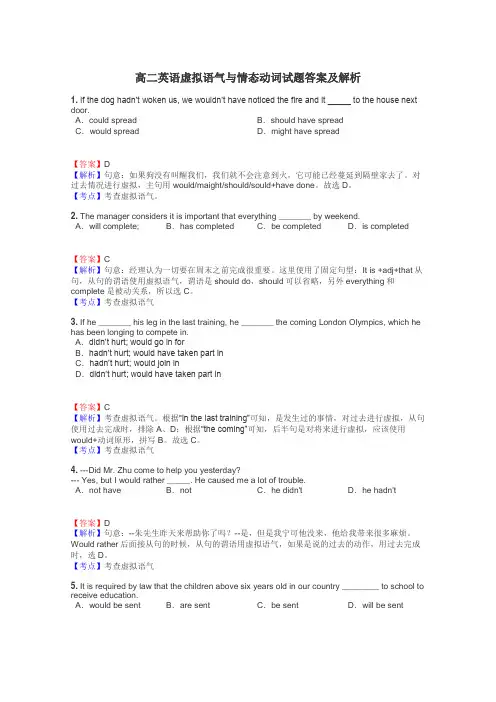
高二英语虚拟语气与情态动词试题答案及解析1.If the dog hadn’t woken us, we wouldn’t have noticed the fire and it _____ to the house next door.A.could spread B.should have spreadC.would spread D.might have spread【答案】D【解析】句意:如果狗没有叫醒我们,我们就不会注意到火,它可能已经蔓延到隔壁家去了。
对过去情况进行虚拟,主句用would/maight/should/sould+have done。
故选D。
【考点】考查虚拟语气。
2. The manager considers it is important that everything _______ by weekend.A.will complete;B.has completed C.be completed D.is completed【答案】C【解析】句意:经理认为一切要在周末之前完成很重要。
这里使用了固定句型:It is +adj+that从句,从句的谓语使用虚拟语气,谓语是should do,should可以省略,另外everything和complete是被动关系,所以选C。
【考点】考查虚拟语气3. If he _______ his leg in the last training, he _______ the coming London Olympics, which he has been longing to compete in.A.didn’t hurt; would go in forB.hadn’t hurt; would have taken part inC.hadn’t hurt; would join inD.didn’t hurt; would have taken part in【答案】C【解析】考查虚拟语气。
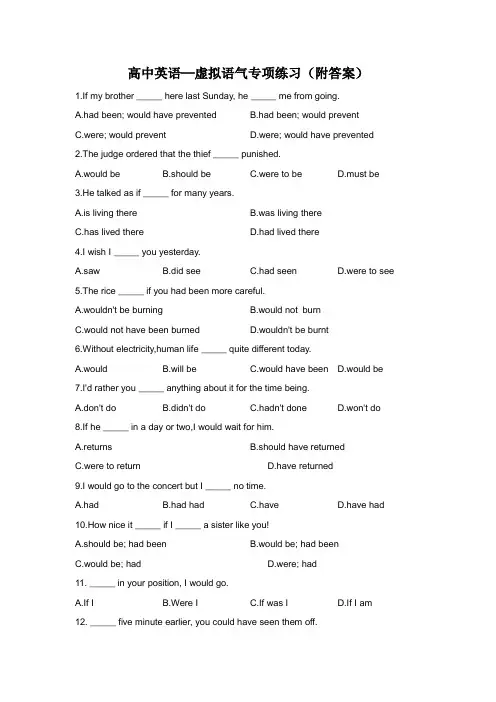
高中英语─虚拟语气专项练习(附答案)1.If my brother _____ here last Sunday, he _____ me from going.A.had been; would have preventedB.had been; would preventC.were; would preventD.were; would have prevented2.The judge ordered that the thief _____ punished.A.would beB.should beC.were to beD.must be3.He talked as if _____ for many years.A.is living thereB.was living thereC.has lived thereD.had lived there4.I wish I _____ you yesterday.A.sawB.did seeC.had seenD.were to see5.The rice _____ if you had been more careful.A.wouldn't be burningB.would not burnC.would not have been burnedD.wouldn't be burnt6.Without electricity,human life _____ quite different today.A.wouldB.will beC.would have beenD.would be7.I'd rather you _____ anything about it for the time being.A.don't doB.didn't doC.hadn't doneD.won't do8.If he _____ in a day or two,I would wait for him.A.returnsB.should have returnedC.were to returnD.have returned9.I would go to the concert but I _____ no time.A.hadB.had hadC.haveD.have had10.How nice it _____ if I _____ a sister like you!A.should be; had beenB.would be; had beenC.would be; hadD.were; had11. _____ in your position, I would go.A.If IB.Were IC.If was ID.If I am12. _____ five minute earlier, you could have seen them off.A.If you should arriveB.If you arrivedC.Had you arrivedD.Should you arrive13.I am glad we had a map. I am sure we _____ if we _____ one.A.would have got lost; hadn't hadB.would get lost; hadn'tC.couldn't have get lost; had hadD.may get lost; don't have14.The doctor insisted that this patient _____ seriously ill and he _____ on.A.should be,should be operatedB.should have been; had been operatedC.had been; should operateD.was; should be operated15.I wish my husband _____ as well as _____.A.will dress; youB.be dressed; youC.dressed; youD.dress; you16.If we _____ hard in the past few years, things _____ so smoothly now.A.hadn't worked; had goneB.hadn't been working; wouldn't be goingC.didn't work; weren't goingD.hadn't worked; would have gone17.I _____ each of the group leaders immediately work out a practical plan of study.A.hopeB.expectC.wishD.suggest18.Without the air to hold some of the sun's heat. The earth at night _____, too cold for us to live.A.would be freezing coldB.can freeze coldlyC.will be freezing coldlyD.would be frozen cold19.--- _____ you booked the tickets in advance, we would have left for Italy.---If so, we _____ the ball and failed to see a lot of interesting people there.A.had; should missB.should; might have missedC.should; had missedD.had; would have missed20.I am not free today. If I _____ free today, I _____ and visit some of my friends.A.am; will goB.were; would goC.shall be; may goD.be; must go21.It is strange that she _____ so upset.A.isB.will beC.becameD.be22.You have been working on this morning. It's time you _____.A.have a restB.will have a restC.had a restD.might have a rest23.But for your help, I _____.A.should not have succeededB.had not succeededC.were to succeedD.have not succeeded24.If only the weather _____ fine!A.beB.isC.wasD.were25.--- I won't go climbing the mountain this afternoon because I want to have a rest. --- _____ change yourmind,give me acall.A.Might youB.Should youC.Were youD.Would you26.What the workers insisted on was that they _____ more pay.A.should giveB.be givenC.would be givenD.were given27. _____ I _____ more money with me that day, I _____ you some.A.Did; have; could lendB.Have; had; would lendC.had; have; would have lentD.Had; had; would have lent28.It is necessary that all the young trees _____ more water.A.be givenB.must be givenC.will be givenD.will have been given29.It is demanded that we _____ there on foot.A.not to goB.don't goC.won't goD.not go30.John's pale face suggested that he _____ ill, and his parents suggested that he _____ a medical examination.A.be; should haveB.was; haveC.should be; hadD.was; has31.If my lawyer _____ here last Saturday, he _____ me from going.A.had been; would have preventedB.had been; would preventC.were; would preventD.were; would have prevented32.If Joe _____ in your position, he wouldn't be different.A.had beenB.wereC.isD.would be33.We had time,we _____ another try.A.are going to beB.would haveC.should have hadD.had34.If the sun _____ in the west, my life wouldn't be different.A.were to riseB.risesC.had risenD.has risen35.Give more time and money,we _____ better than what it is.A.didB.had doneC.would have doneD.would do36.I think it is high time that the children _____ to school.A.goB.will goC.wentD.are going37.Mr.Dean _____ a professor today if he had studied in a university.A.will beB.could beC.isD.had been38.Tom would bring you what you've been expecting if he _____ here tomorrow.esB.would comeC.will comeD.should come39.My grandma would have died if the doctor _____ in time.A.should comeB.would comeC.hadn't comeD.has no been40.If you _____ hard in the past few months, your lessons wouldn't be going so smoothly now.A.hadn't been studyingB.haven't studiedC.didn't studyD.wouldn't study41.The teacher demanded that the students _____ late for class.A.are notB.will not beC.shouldn't beD.wouldn't be42.Even though my friend was very busy, he _____ me more help.A.might have givenB.may have givenC.might giveD.may give43.It was ordered that no smoking _____ in the library.A.should allowB.be allowedC.will be allowedD.is allowed44.Without your encouragement and support, I _____.A.would not succeedB.would not have succeededC.should not succeededD.would have succeeded45.The boss required that Amy _____ at the company by eight.A.isB.would beC.beD.will be46.It's high time that we _____.A.should startB.startC.would startD.will start47.Betty wished that she _____ Mary about the bad news.A.didn't tellB.hadn't toldC.hasn't toldD.doesn't tell48.I'd rather you just _____ in bed and _____ anything for at least three weeks.A.stayed; didB.would stay; didn't doC.stayed; didn't doD.stay; don't do49.But for air and water, there _____ no life on the earth.A.will beB.isC.would beD.has been50.Take care in case you _____ cold.A.caughtB.should catchC.would catchD.catching51.My suggestion is that a few persons _____ to help us.A.will be sentB.sentC.are sentD.be sent52.--- If he _____, he _____ that food.--- Luckily he was sent to the hospital immediately.A.was warned; would not takeB.had been warned; wouldn't have takenC.would be warned; hadn't takenD.would have been warned; hadn't taken53. _____ anyone call, please take a message.A.IfB.ShouldC.WouldD.Will54.If only we _____ a phone! I'm tired of queuing outside the public phone box.A.hadB.haveC.would haveD.should have55.She looks as if she _____ mad.A.beB.would beC.wereD.should be56.If the dog hadn't woken us we _____ the fire and it _____ the house next door.A.hadn't noticed; had spread toB.wouldn't have noticed; might have spread toC.wouldn't notice; would have spread toD.didn't; notice; spread to57.I wish I _____ to talk this over with Mr. Zhang when he was here last night.A.had been ableB.should be ableC.have been ableD.were able58.If you were to do it, the result _____ different.A.will beB.would beC.should beD.would have been59. _____ today, he would get there by Saturday.A.If he leavesB.Was he leavingC.Would he leaveD.Were he to leave60.It was a lovely day yesterday. I wish I _____ at the seaside then.A.wereB.will beC.should beD.should have been61.It is a great pity that he _____ so careless.A.wasB.will beC.should beD.can be62.Even if I _____ with you then, I _____ much for you.A.would be; would not doB.were; should not have doneC.had been; would not doD.had been; should not have done63. _____, I would not refuse his invitation.A.Were I youB.If I should be youC.If I was youD.If I had been you64.The whole family greeted me as though I _____ a member of the family.A.amB.wereC.wouldD.should be65. _____, man could not live at all.A.He had been hereB.Here he had beenC.Been here he hadD.Had he been here66. _____, man could not live at all.A.Were it not for the sunB.If it was for the sunC.Had it not been for the sunD.If it shouldn't be for the sun67.Their suggestion that she _____ till next week is reasonable.A.waitB.are waitingC.will waitD.would wait68.If there were no subjunctive mood, English _____ much easier.A.will beB.would have beenC.could have beenD.would be69.If she had worked harder, she _____.A.would succeedB.had succeededC.should succeedD.would have succeeded70.-- The experiment had failed.---I suggest you _____ again.A.tryB.tryingC.will tryD.would try71.When a pencil is partly in a glass of water, it looks as if it _____.A.breaksB.had brokenC.were brokenD.had been broken72.We _____ the work on time without your help.A.hadn't had finishedB.didn't have finishedC.can't have finishedD.couldn't have finished73.If only I _____ as young as you are!A.beB.amC.wereD.being74.Should it rain, the crops _____.A.will be savedB.would be savedC.had been savedD.would have been saved75.It is important that we _____ wild animals.A.will protectB.should protectC.shall protectD.are protecting76.He is not a pilot, but he _____ he _____.A.wishes; wasB.wants; wasC.wants; wereD.wishes; were77.Look at the clock! It's time _____ home.A.we goB.we wentC.we are goingD.for us go78.They talked as if they _____ friends for years.A.areB.wereC.have beenD.had been79.I _____ the exam, but I failed.A.expected to have passedB.expected to passC.expect to passD.expect to have passed80.If you had taken your medicine yesterday, you _____ well now.A.would have beenB.should beC.would beD.will be81.If you _____ harder. You _____ tomorrow's exam.A.studied; will passB.studied; should have passedC.had studied; would passD.had studied; would have passed82.He ordered the work _____ started at once.A.beB.wasC.would beD.were83.You _____ ten minutes ago, but you didn't.eB.should comeC.would have comeD.should have come84.--- _____ you mind my opening the window?---Not at all.A.WouldB.WillC.ShallD.Should85.He insisted that we all _____ in his office at three o'clock.A.shall beB.beC.to beD.would be86.It is strange that he _____ such a mistake.A.have madeB.madeC.has madeD.makes87.Tom, you are too lazy! This job _____ three days ago.A.should finishB.must have finishedC.ought to have been finishedD.was about to finish88. ‘He is angry. So we _____ better be careful,’ she said.A.hadB.shouldC.wouldD.might89. _____ I in good health, I _____ with you.A.Were; will goB.Was; wentC.Was; should goD.Were; would go90.But for air and water, nothing _____.A.can liveB.will be able to liveC.could liveD.couldn't live91.If I were you, I _____ be worried.A.must notB.won'tC.shouldn'tD.shall not92.I wish I _____ well as she.A.could singB.can singC.singD.shall sing93.Without electricity, human life _____ quite different today.A.isB.will beC.would have beenD.would be94.I _____ study French than Japanese.A.should likeB.would ratherC.had betterD.would like to95.It's necessary that you _____ spoken English now and then.A.might practiseB.must practiseC.should practiseD.practised96.My suggestion is that a few more people _____ there to help me.A.be sentB.have sentC.sentD.should sent97.It is high time that all of you _____ to bed.A.goB.will goC.must goD.went98.Everything will go on as usual as if _____ happened.A.nothing hadB.anything hadn'tC.nothing wasD.anything was not99.The teacher demanded that the exam _____ before eleven.A.would be finishedB.must be finishedC.be finishedD.must be finished100.I'd rather you _____ at home all day today.A.stayB.stayedC.should stayD.had stay答案:1—5 ABDCC 6—10 DBCAC 11—15 BCADC 16—20 BDADB 21—25 DCADB 26—30 BDADB 31—35 ABBAC 36—40 CBDCA 41—45 CABBC 46—50 ABCCB 51—55 DBBAC 56—60 BABDD 61—65 CDABD 66—70 AADDA 71—75 CDCBB 76—80 DBDBA 81—85 CADAB 86—90 ACADC 91—95 CADBC 96—100 ADACB.。
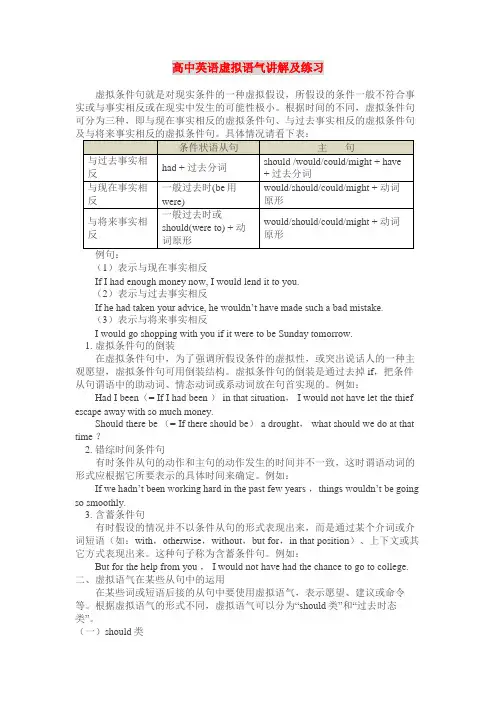
高中英语虚拟语气讲解及练习虚拟条件句就是对现实条件的一种虚拟假设,所假设的条件一般不符合事实或与事实相反或在现实中发生的可能性极小。
根据时间的不同,虚拟条件句可分为三种,即与现在事实相反的虚拟条件句、与过去事实相反的虚拟条件句(1)表示与现在事实相反If I had enough money now, I would lend it to you.(2)表示与过去事实相反If he had taken your advice, he wouldn’t have made such a bad mistake.(3)表示与将来事实相反I would go shopping with you if it were to be Sunday tomorrow.1. 虚拟条件句的倒装在虚拟条件句中,为了强调所假设条件的虚拟性,或突出说话人的一种主观愿望,虚拟条件句可用倒装结构。
虚拟条件句的倒装是通过去掉if,把条件从句谓语中的助动词、情态动词或系动词放在句首实现的。
例如:Had I been(= If I had been ) in that situation, I would not have let the thief escape away with so much money.Should there be (= If there should be) a drought, what should we do at that time ?2. 错综时间条件句有时条件从句的动作和主句的动作发生的时间并不一致,这时谓语动词的形式应根据它所要表示的具体时间来确定。
例如:If we hadn’t been working hard in the past few years ,thing s wouldn’t be going so smoothly.3. 含蓄条件句有时假设的情况并不以条件从句的形式表现出来,而是通过某个介词或介词短语(如:with,otherwise,without,but for,in that position)、上下文或其它方式表现出来。
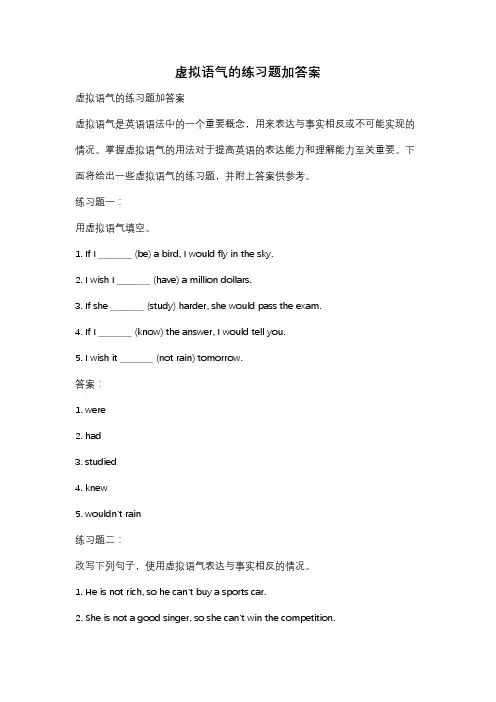
虚拟语气的练习题加答案虚拟语气的练习题加答案虚拟语气是英语语法中的一个重要概念,用来表达与事实相反或不可能实现的情况。
掌握虚拟语气的用法对于提高英语的表达能力和理解能力至关重要。
下面将给出一些虚拟语气的练习题,并附上答案供参考。
练习题一:用虚拟语气填空。
1. If I ________ (be) a bird, I would fly in the sky.2. I wish I ________ (have) a million dollars.3. If she ________ (study) harder, she would pass the exam.4. If I ________ (know) the answer, I would tell you.5. I wish it ________ (not rain) tomorrow.答案:1. were2. had3. studied4. knew5. wouldn't rain练习题二:改写下列句子,使用虚拟语气表达与事实相反的情况。
1. He is not rich, so he can't buy a sports car.2. She is not a good singer, so she can't win the competition.3. They didn't study hard, so they failed the test.4. I don't have a passport, so I can't travel abroad.5. It's not warm, so we can't go swimming.答案:1. If he were rich, he could buy a sports car.2. If she were a good singer, she could win the competition.3. If they had studied hard, they wouldn't have failed the test.4. If I had a passport, I could travel abroad.5. If it were warm, we could go swimming.练习题三:选择正确的虚拟语气形式填空。
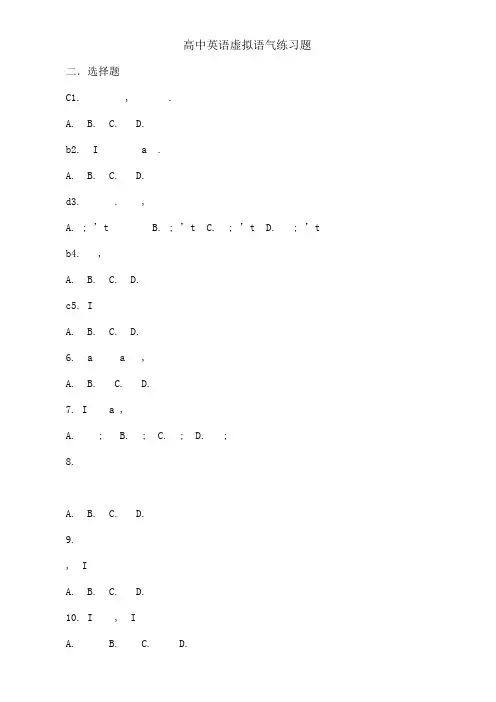
高中英语虚拟语气练习题二.选择题C1. , .A. B. C. D.b2. I a .A. B. C. D.d3. . ,A. ; ’tB. ; ’tC. ; ’tD. ; ’t b4. ,A. B. C. D.c5. IA. B. C. D.6. a a ,A. B. C. D.7. I a ,A. ;B. ;C. ;D. ;8.A. B. C. D.9., IA. B. C. D.10. I , IA. B. C. D.11. ,A. B. C. D.12. ,A. ,B. ,C. ,D. ,13. ,A. B. C. D.14. ,A. . C. D.15. ,A. B. C. D.16. I . ,A. B. C. D.17. , .A. ,B. ,C. ,D. ,18. ,A. ,B. ,C. ,D. ’t ,19. ,A. B. C. D.20.A. ’tB. ’tC. ’tD. ’t21. ’s , ,A. B. C. D.22.A. B. C. D.23. aA. B. C. D.24.,A. I’dB. I’dC. I ’ tD. I’d25. IA. ’tB. ’tC. ’tD. ’t26. ,A. B. C. D. ’t27. IA. B. ’t C. ’t D. ’t28.A. B. C. D.29.A. B. C. D.30. aA. B. C. D.31.A. ,B. ,C. ,D. ,32. I a IA. B. C. ’t D. ’t33.A. B. C. D.34.A. B. C. D.35.A. B. C. D.36. I IA. B. C. D.37.A. B. C. D.38. IA. B. C. D.39.A. B. C. D.40.A. B. C. D.41.A. B. C. D.42. , . I ……’t “”, I . , !A. B. ’t C. D. ’t43. I . . I IA. ,B. ,C. ,D. ,44. I I ! IA. B. ’t C. D. ’t45. I’t .A. B. C. D.46. ’sA. ,B. ,C. ,D. ,47. ,A. B. C. D.48. .A. ,B. ,C. ,D. ,49.A. B. C. D.50. a .A. B. C. D.51. ,A. B. C. D.52. aA. B. C. D.53. IA. B. C. D.54. , I a , I IA. B. C. D.55.A. B. C. D.56. I . ,A. B. C. D.57. ,A. B. C. D.58. ,A. ,B. ,C. ,D. ,答案C BD B C C C B A A D A B A C D B C D AD C C B A C B B A B D C C A B B D B A AC D C B C D D B C D B B A A A C D C虚拟语气在条件状语从句中的应用【经典例题】1. , .A. ;B. ;C. ;D. ;2. I , I .A. ’t B ’tC. ’tD. ’t3.— , .A. ;B. ;C. ;D. ;4. I ’t . , .A. B. C. D.【答案与解析】1.A.本题考查虚拟语气。
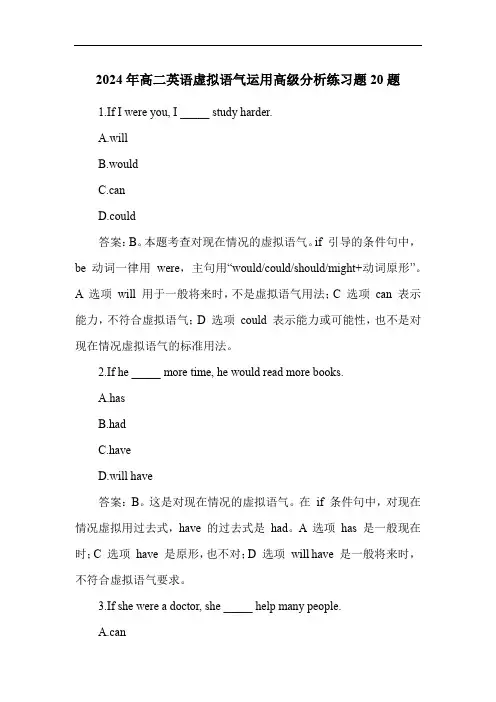
2024年高二英语虚拟语气运用高级分析练习题20题1.If I were you, I _____ study harder.A.willB.wouldC.canD.could答案:B。
本题考查对现在情况的虚拟语气。
if 引导的条件句中,be 动词一律用were,主句用“would/could/should/might+动词原形”。
A 选项will 用于一般将来时,不是虚拟语气用法;C 选项can 表示能力,不符合虚拟语气;D 选项could 表示能力或可能性,也不是对现在情况虚拟语气的标准用法。
2.If he _____ more time, he would read more books.A.hasB.hadC.haveD.will have答案:B。
这是对现在情况的虚拟语气。
在if 条件句中,对现在情况虚拟用过去式,have 的过去式是had。
A 选项has 是一般现在时;C 选项have 是原形,也不对;D 选项will have 是一般将来时,不符合虚拟语气要求。
3.If she were a doctor, she _____ help many people.A.canB.willC.wouldD.could答案:C。
对现在情况虚拟,主句用“would/could/should/might+动词原形”。
A 选项can 不是虚拟语气用法;B 选项will 用于一般将来时,不对;D 选项could 虽然也可以,但这里用would 更符合表达习惯。
4.If they _____ rich, they would travel around the world.A.areB.wereC.will beD.would be答案:B。
对现在情况虚拟,if 条件句中be 动词用were。
A 选项are 是一般现在时;C 选项will be 是一般将来时;D 选项would be 是虚拟语气但不是在条件句中。
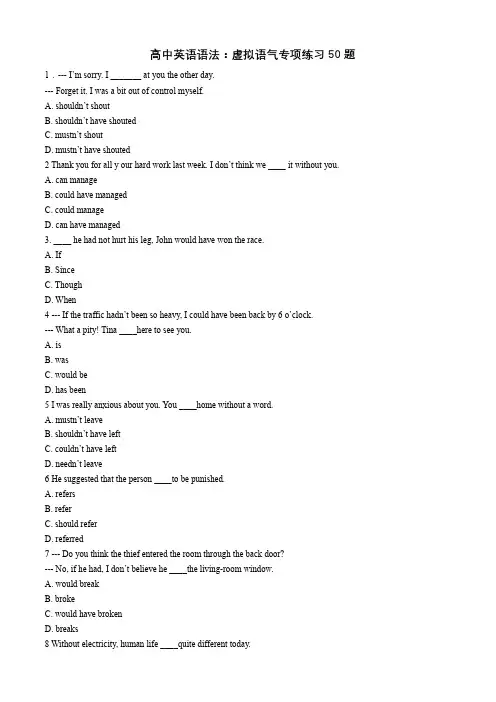
高中英语语法:虚拟语气专项练习50题1.--- I’m sorry. I _______ at you the other day.--- Forget it. I was a bit out of control myself.A. shouldn’t shoutB. shouldn’t have shoutedC. mustn’t shoutD. mustn’t have shouted2 Thank you for all y our hard work last week. I don’t think we ____ it without you.A. can manageB. could have managedC. could manageD. can have managed3. ____ he had not hurt his leg, John would have won the race.A. IfB. SinceC. ThoughD. When4 --- If the traffic hadn’t been so heavy, I could have been back by 6 o’clock.--- What a pity! Tina ____here to see you.A. isB. wasC. would beD. has been5 I was really anxious about you. You ____home without a word.A. mustn’t leaveB. shouldn’t have leftC. couldn’t have leftD. needn’t leave6 He suggested that the person ____to be punished.A. refersB. referC. should referD. referred7 --- Do you think the thief entered the room through the back door?--- No, if he had, I don’t believe he ____the living-room window.A. would breakB. brokeC. would have brokenD. breaks8 Without electricity, human life ____quite different today.A. isB. will beC. would have beenD. would be9 --- ____he come to see you as he promised?--- Of course, please, and I’d rather he ____ me the truth.A. Will; informedB. Shall; toldC. Should; will tellD. Can; tell10 --- He looks very hot and dry.--- So ____ if you had a temperature of 39.A. would youB. will youC. would you have beenD. do you11 I forget where I read the article, or I ________ it to you now.A. will showB. would showC. am going to showD. am showing12. “It looks as if he were drunk.” “So it does. _________.”A. He’d better give up drinkingB. He shouldn’t have drunk so muchC. Health is more important than drinkD. I wonder why he is always doing so13. “Mary looks hot and dry” “So _________ you if you had so high a fever.”A. doB. areC. willD. would14. “He will come tomorrow.” “But I’d rather he _________ the day after tomorrow.”A. will comeB. is comingC. cameD. had come15. All the doctors in the hospital insisted that he ________ badly wounded and that he ________ at once.A. should be; be operated onB. were; must be operated onC. was; should be operatedD. was; be operated on16. _________ smoking, he would not have got cancer in the lung.A. Was he given upB. Had he given upC. Did he giveD. If he gave up17. What a pity! Considering his ability and experience, he ____ better。
虚拟语气讲解及练习一.非真实条件句的虚拟情况:1.与现在事实相反的条件e.g. If I were you, I would go at once.If I had HIV, I would know because I would feel sick.2.与过去事实相反e.g. If you had come a few minutes earlier, you would have met him.If she had told him about the danger, he would not have hurt.3.与将来事实相反e.g. If it were sunny tomorrow, I would come to see you.If he should fail in the experiment this time, he would try again.If we were to panic(受惊,惊慌), we should not be able to help.4.混合时间条件句:主从句不一定用指同一时间的动词。
即:假设条件从句谓语动词发生的时间与主句所假设的谓语动词不一致,叫做混合虚拟语气(错综条件虚拟语气)。
主句和从句的谓语动词要依照假设的时间而定。
e.g. If you ____that late movie last night, you wouldn’t be so sleepy.A.haven’t watchedB.didn’t watchC. hadn’t watchedD.wouldn’t watchedIf Paul had received six more votes in the last election, he would be our chairman now.If the weather had been finer, the crops would be growing still better.If you had followed the teacher’s advice, you wouldn’t be in the hospital.e.g If I had gone to a key university, I would earn more money now.5.含蓄条件句:有时假设的条件不通过条件从句表示而含蓄在介词短语或上下文中。
虚拟语气专练1. If only he ____quietly as the doctor instructed, he would not suffer so much now.A. liesB. layC. had lainD. should lie2. You did not let me drive. If we ____in turn, you ____ so tiredA. drove; didn’t getB. drove; wouldn’t getC. were driving; wouldn’t getD. had driven ; wouldn’t have got3. _____it rain tomorrow, we would have to put off the visit to the Yangpu BridgeA. WereB. ShouldC. WouldD. Will4. I suggested the person _____ to be put into prisonA. refersB. referringC. referredD. refer5. ---Your aunt invites you to the movies today---I had rather she ____ me tomorrow than todayA. tellsB. toldC. would tellD. had told6. I was ill that day, otherwise I ____ the sports meetA. would have taken part inB. took part inC. had taken part inD. would take part in7. He ____busy yesterday, or he ___you with your experiment.A. was, had helpedB. was, would have helpedC. had been, would have helpedD. were, would have helped8. Without electricity, human life ____quite difficult todayA. isB. will beC. would have beenD. would be9. The kind-hearted couple treat the orphan very well as though he ____ their own son.A. isB. wereC. had beenD. should be10. How the old people wish that they ____young once moreA. wereB. could becomeC. had beenD. should be11. If I had had enough time, I___ my work.A. would finishB. must have finishedC. would have finishedD. had finished12.Ten minutes earlier, they ___ the plane.A. will catchB. would catchC. would have caughtD. will have caught13. Mr Green requires that the students ___ a composition every other week.A. writeB. writtenC. would writeD. will write14.Had he studied hard, he___ the exam.A. would passB. could passC. had passedD. would have passed15.I wish I ___ what is happening there in his room.A. knowB. knownC. knewD. should know16.If there were no water in the world, everything ___.A. will dieB. would dieC. would have diedD. would have been dead17. ___ what was going to happen, I would never have left her alone.A. Had I knownB. If I knowC. If I knewD. If had I known18.He ordered that the work ___ right away.A. should finishB. finishedC. would be finishedD. be finished19.—Shall we go to the movie tonight?—No, I'd rather ___ at home with our baby. You'd better not leave it to the babysitter at night.A. you stayedB. you stayC. stayedD. stay20. ___ in your position, I would help him.A. Was IB. Were IC. If I amD. If I had been21.I ___, but I was stopped by the heavy rain.A. mean to comeB. meant to comeC. had meant to comeD. meant coming22.Mrs Black insists___ in that old hotel.A. not to stayB. not stayingC. staying notD. that she not stay23.If you had spoken clearly, you would___.A. understand itB. have understoodC. be understoodD. have been understood24. If you ___ that late movie last night, you wouldn't be so sleepy.A. haven't watchedB. hadn't watchedC. didn't watchD. wouldn't have watched25. The teacher demanded that the exam _____ before eleven.A. must finishB. would be finishedC. be finishedD. must be finished26. She made the demand that the journalists _____ at once ______ Iraq.A. leave; forB. leave; toC. left; toD. to be left; for27. The suggestion has been made _____ the basketball game _____ put off.A. for; toB. that; beC. which; should beD. to; being28. The order came that the medical supplies _____ to Beijing for the Sars soon.A. would be sentB. should sendC. be sentD. must be sent29. Had you listened to the doctor, you _____ all right now.A. areB. wereC. would beD. would have been30. _____ any change about the date, please tell me immediately.A. Will there beB. Should there beC. There will beD. There should be31. _____ today, he would get there by Friday.A. Would he leaveB. Was he leavingC. Were he to leaveD. If he leave32. Should it rain, the crops _____ .A. would be savedB. would have been savedC. will be savedD. had been saved33. You _____ come earlier. The bus left a moment ago.A. wouldB. should haveC. mayD. have34. I _____ you some money, but I hadn’t any on me then.A. would lendB. would have lentC. could lendD. may have lent35. --- “Hav e you ever been to Beijing?”--- “No, but I wish I _____”A. haveB. willC. doD. had36. I’m glad I went over all my notes; otherwise _____ .A. I may have failedB. I’d failC. I’d have failedD. I’ll have failed37. --- “What will you do during the summer holiday?”--- “I don’t know, but it’s high time _____ something.”A. I’m decidingB. I’ll decideC. I decidedD. I decide38. What would we do if it _____ tomorrow?A. should snowB. would snowC. snowD. will snow39. If only I _____ my watch!A. hadn’t lostB. haven’t lostC. didn’t lostD. don’t lose40. You _____ such a serious mistake if you had followed his advice.A. may not makeB. might not makeC. shouldn’t have madeD. might not have made41. We _____ the work on time without your help.A. hadn’t had finishedB. didn’t have finishedC. couldn’t have finishedD. can’t have finished42. --- “Where have you been?”--- “I got caught in traffic; otherwise _____ sooner.”A. I would be hereB. I have been hereC. I had been hereD. I would have been here43. If it were not for the fact that you _____ ill, I would ask you to do this right n ow.A. wereB. had beenC. areD. should be44. I’d rather you ___ right away.A. leaveB. leftC. will leaveD. to leave45. He is working hard for fear that he ___.A. failsB. failedC. would failD. fail46. The teacher agreed to the suggestion that the students ___ two weeks to prepare for the exam.A. giveB. should giveC. be givenD. would be given47. I was busy yesterday, otherwise I ___ your birthday party.A. attendedB. had attendedC. would attendD. would have attended48. The two strangers talked as if they ___ friends for years.A. wereB. would beC. have beenD. had been49. We ___ our lives had it not been for the policeman.A. would have lostB. should loseC. might loseD. could have lost50. ---- I thought you would come back tomorrow.---- I would if I ___ to attend a meeting.A. don’t haveB. didn’t haveC. will not haveD. would not have51. It ___ very nice if only it were possible.A. will beB. would beC. isD. were52. Without your help, our team ___ the last match.A. won’t winB. will loseC. wouldn’t have wonD. can’t win53. ___, I would take an umbrella with me.A. Had I been youB. I were youC. Were I youD. I had been you54. If I had hurried, I ___ the train.A. would catchB. could catchC. would have caughtD. had caught55. Tom insisted that John ___ it for no one was in the room except him.A. doB. doesC. didD. would do56. If I had known that, I ___ so.A. wouldn’t doB. wouldn’t have doneC. won’t doD. have not done57. The doctor proposed that she ___.A. will not smokeB. not smokeC. would not smokeD. did not smoke58. If I ___ you, I wouldn’t return the call.A. beB. amC. wasD. were59. If the doctor had been available, the child ___.A. would not dieB. would not have diedC. could not dieD. could not have died60. Dr. Bethune worked hard as if he ___.A. never had felt tiredB. had never felt tiredC. never felt tiredD. was tired never。
高二英语虚拟语气与情态动词试题答案及解析1.––What a journey! We’ve finally arrived!––_____ an out-of-date train schedule, we would not have missed the train.A.Had we not used B.Did we useC.If we didn’t use D.If we had used【答案】A【解析】试题分析: 句意:真糟糕的旅行!我们终于到了。
如果我们没有用过期的列车时刻表,我们就不会错过火车了。
根据后句中的would not have missed可知句子使用了虚拟语气,是对过去发生的事情进行假设,主句应该用过去完成时,当句中有had ,should ,were时,可以省略if,把这些词提前,构成倒装结构,选A。
【考点】考查虚拟语气2.“You are too selfish. It’s high time you that you are not the most important person in the world.” Peter said to his boss angrily.A.realized B.realize C.will realize D.have realized]【答案】A【解析】句意:皮特生气的对老板说:“你太自私了。
正是你应该意识到你不是这个实际上最重要的人的时候了。
这里使用了句型:It is high time+从句,从句的谓语用should do或一般过去式,表示虚拟语气,所以选A。
【考点】考查虚拟语气3. --The mistake_____, I had been more careful.---But you weren’t at that time.A.might have avoided B.would avoidC.would be avoided D.might have been avoided【答案】 D【解析】句意:--如果我更加仔细一些,这个错误就会避免。
高中英语虚拟语气讲解及练习虚拟条件句就是对现实条件的一种虚拟假设,所假设的条件一般不符合事实或与事实相反或在现实中发生的可能性极小。
根据时间的不同,虚拟条件句可分为三种,即与现在事实相反的虚拟条件句、与过去事实相反的虚拟条件句(1)表示与现在事实相反If I had enough money now, I would lend it to you.(2)表示与过去事实相反If he had taken your advice, he wouldn’t have made such a bad mistake.(3)表示与将来事实相反I would go shopping with you if it were to be Sunday tomorrow.1. 虚拟条件句的倒装在虚拟条件句中,为了强调所假设条件的虚拟性,或突出说话人的一种主观愿望,虚拟条件句可用倒装结构。
虚拟条件句的倒装是通过去掉if,把条件从句谓语中的助动词、情态动词或系动词放在句首实现的。
例如:Had I been(= If I had been ) in that situation, I would not have let the thief escape away with so much money.Should there be (= If there should be) a drought, what should we do at that time ?2. 错综时间条件句有时条件从句的动作和主句的动作发生的时间并不一致,这时谓语动词的形式应根据它所要表示的具体时间来确定。
例如:If we hadn’t been working hard in the past few years ,thing s wouldn’t be going so smoothly.3. 含蓄条件句有时假设的情况并不以条件从句的形式表现出来,而是通过某个介词或介词短语(如:with,otherwise,without,but for,in that position)、上下文或其它方式表现出来。
高中英语虚拟语气讲解及练习虚拟条件句就是对现实条件的一种虚拟假设,所假设的条件一般不符合事实或与事实相反或在现实中发生的可能性极小。
根据时间的不同,虚拟条件句可分为三种,即与现在事实相反的虚拟条件句、与过去事实相反的虚拟条件句(1)表示与现在事实相反If I had enough money now, I would lend it to you.(2)表示与过去事实相反If he had taken your advice, he wouldn’t have made such a bad mistake.(3)表示与将来事实相反I would go shopping with you if it were to be Sunday tomorrow.1. 虚拟条件句的倒装在虚拟条件句中,为了强调所假设条件的虚拟性,或突出说话人的一种主观愿望,虚拟条件句可用倒装结构。
虚拟条件句的倒装是通过去掉if,把条件从句谓语中的助动词、情态动词或系动词放在句首实现的。
例如:Had I been(= If I had been ) in that situation, I would not have let the thief escape away with so much money.Should there be (= If there should be) a drought, what should we do at that time ?2. 错综时间条件句有时条件从句的动作和主句的动作发生的时间并不一致,这时谓语动词的形式应根据它所要表示的具体时间来确定。
例如:If we hadn’t been working hard in the past few years ,thing s wouldn’t be going so smoothly.3. 含蓄条件句有时假设的情况并不以条件从句的形式表现出来,而是通过某个介词或介词短语(如:with,otherwise,without,but for,in that position)、上下文或其它方式表现出来。
高中英语虚拟语气讲解及练习虚拟条件句就是对现实条件的一种虚拟假设,所假设的条件一般不符合事实或与事实相反或在现实中发生的可能性极小。
根据时间的不同,虚拟条件句可分为三种,即与现在事实相反的虚拟条件句、与过去事实相反的虚拟条件句(1)表示与现在事实相反If I had enough money now, I would lend it to you.(2)表示与过去事实相反If he had taken your advice, he wouldn’t have made such a bad mistake.(3)表示与将来事实相反I would go shopping with you if it were to be Sunday tomorrow.1. 虚拟条件句的倒装在虚拟条件句中,为了强调所假设条件的虚拟性,或突出说话人的一种主观愿望,虚拟条件句可用倒装结构。
虚拟条件句的倒装是通过去掉if,把条件从句谓语中的助动词、情态动词或系动词放在句首实现的。
例如:Had I been(= If I had been ) in that situation, I would not have let the thief escape away with so much money.Should there be (= If there should be) a drought, what should we do at that time ?2. 错综时间条件句有时条件从句的动作和主句的动作发生的时间并不一致,这时谓语动词的形式应根据它所要表示的具体时间来确定。
例如:If we hadn’t been working hard in the past few years ,thing s wouldn’t be going so smoothly.3. 含蓄条件句有时假设的情况并不以条件从句的形式表现出来,而是通过某个介词或介词短语(如:with,otherwise,without,but for,in that position)、上下文或其它方式表现出来。
虚拟语气用法详解一、条件句中的虚拟语气1. 条件句中虚拟语气的形式从句中提出一种与客观现实不相符或根本不可能存在的条件,主句会产生的一种不可能获得的结果。
条件句中的虚拟语气根据不同的时间有三种不同的形式。
2. 条件中的虚拟语气的举例(1) 将来时的条件句中的虚拟语气。
如:If he should go to Qing Hua University, he would make full use of his time. 如果他要上清华大学的话,他就会充分利用他的时间了。
If he were to come here, he would tell us about it. 如果他要来的话,他会通知我们一声。
(2) 现在时的条件句中的虚拟语气。
如:If he were free, he would help us. 要是他有空的话,它会帮助我们的。
If he studied at this school, he would know you well. 如果他在这所学校学习的话,它会对你很熟悉。
(3) 过去时的条件句中的虚拟语气。
如:If I had seen the film, I would have told you about it. 我如果看过这场电影,我会把电影内容告诉你了。
If I had got there earlier, I would have met Mr. Li. 如果我早点到那儿,我就会会到了李先生。
3. 运用条件句中的虚拟语气时,须注意的几个问题(1) 当从句的主语为第三人称单数时,谓语动词若是系动词be时,可用was代替were。
但在倒装虚拟结构及if I were you, as it were中,只能用were。
如:Were I ten years younger, I would study abroad. 要是我还年轻十岁的话,我会去国外学习。
If I were you, I would try my best to grasp the chance. 要是我是你的话,我要尽力抓住这次机会。
(2) 有时,虚拟条件句中,主、从句的动作若不是同时发生时,须区别对待。
①从句的动作与过去事实相反,而主句的动作与现在或现在正在发生的事实不符。
如:If I had worked hard at school, I would be an engineer, too. 如果我在学校学习刻苦的话,我现在也会使工程师了If they had informed us, we would not come here now. 如果他们通知过我们的话,我们现在就不会来这里了。
②从句的动作与现在事实相反,而主句的动作与过去事实不符。
如:If he were free today, we would have sent him to Beijing. 如果他今天有空的话,我们会已经派他去北京了(from )。
If he knew her, he would have greeted her. 要是他认识她的话,他肯定会去问候她了。
③从句的动作与过去发生的情况相反,而主句的动作与现在正在发生的情况相反。
如:If it had not been raining too much, the crops would be growing much better. 如果天不下太多的雨的话,庄家会长得更好。
If he had been working hard, he would be working in the office now. 要是他工作一直努力的话,他现在已进了办公室了。
(3) 当虚拟条件句的谓语动词含有were, should, had时,if可省略,而将were, should, had等词置于句首。
如:Should he agree to go there, we would send him there. 要是他答应去的话,我们就派他去。
Were she here, she would agree with us. 如果她在这儿的话,她会同意我们的。
Had he learnt about computers, we would have hired him to work here. 如果她懂一些电脑知识的话,我们会已经聘用他来这里工作了(from )。
(4) 有时,句子没有直接给出假设情况的条件,而须通过上下文或其他方式来判断。
如:I would have come to see you, but I was too busy. 我本该来看你了,然而我太忙了。
But for his help, we would be working now. 要不是他的帮助,我们还会在工作呢。
Without your instruction, I would not have made such great progress. 要是没有你的指导,我不会取得如此大的进步。
(5) 有时,虚拟条件句中,主、从句可以省略其中的一个,来表示说话人的一种强烈的感情。
①省略从句He would have finished it. 他本该完成了。
You could have passed this exam. 你应该会通过这次考试了。
②省略主句If I were at home now. 要是我现在在家里该多好啊。
If only I had got it. 要是我得到它了该多好啊。
二、其他状语从句的虚拟语气1. 目的状语从句中的虚拟语气(1) 在for fear that, in case, lest引导的目的状语从句中,若用虚拟语气时,从句谓语为:should + 动词原形。
并且should不能省略She examined the door again for fear that a thief should come in. 她又把门检查了一遍,以防盗贼的进入。
He started out earlier lest he should be late. 他很早就出发了以防迟到。
(2) 在so that, in order that所引导的目的状语从句中,从句中的谓语为:can / may / could / might / will / would / should + 动词原形。
如(from ):He goes closer to the speaker so that he can hear him clearer. 他走近说话的人以便能挺得更清楚。
He read the letter carefully in order that he should not miss a word. 他把信读得很仔细以便不漏掉一个单词。
2. 让步状语从句中的虚拟语气(1) 在even if, even though 所引导的让步状语从句中,可用虚拟语气,主句、从句的结构与if所引导的条件从句结构相同。
如:Even if he were here himself, he should not know what to do. 即是他亲自来也不知该怎么办。
Nobody could save him even though Hua Tuo should come here. 及时华佗再世也就不了他。
(2) 在whatever,whichever,whenever,whoever, wherever,however, no matter wh-word 等引导的让步状语从句中,从句虚拟语气结构为:①may +动词原形(指现在或将来)。
如:We will finish it on time no matter what / whatever may happen. 不管发生什么事,我们都要按时完成。
We will find him wherever / no matter where he may be. 无论他在哪里,我们都要找到他。
I will wait for him no matter how late he may come. 不管他来的多么晚,我都会等他。
②may +完成式(指过去) ,主句结构不限。
如:You mustn’t be proud whatever / no matter what great progress you may ha ve made.不管你取得了多么大的进步,你也不能骄傲(from )。
We must respect him no matter what / whatever mistakes he may have made. 不管他翻过什么错误,我们必须尊敬他。
(3) 在though, although等引导的让步状语从句中,从句虚拟语气结构为should +动词原形,主句结构不限。
如:Although / Though he should often be late, he is a good student. 尽管他经常迟到,他还是个好学生。
Although / Though he should be secretary, he must obey the rules. 尽管他是书记,他也必须遵守规定。
3. 方式状语从句中的虚拟语气例如:They began to talk warmly as if they had known each other for long. 他们开始热烈的谈论起来就好像他们已相互认识很久了。
He coughed twice as if someone should come. 他咳嗽两声就好像有人要来了。
4. 原因状语从句中的虚拟语气amazed, angry, annoyed, astonished, disappointed, frightened, happy, pleased, proud, s orry, surprised, upset等后面的状语从句中常用虚拟语气。
其虚拟语气的结构为:①should + 原形动词(指现在或将来)。
如:He was angry that you should call him by name. 他很生气,你竟然对他直呼其名。
I was astonished that he should not answer such an easy question. 我很惊讶他竟答不出如此简单的问题。
②should + 完成式, 指过去。
如:I’m very sorry that you should have failed the exam. 我很遗憾,你这次考试竟然失败了。